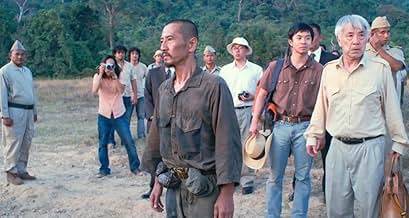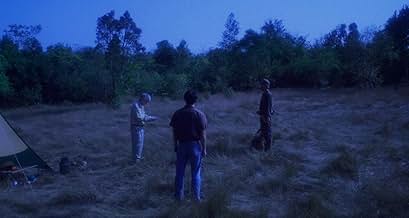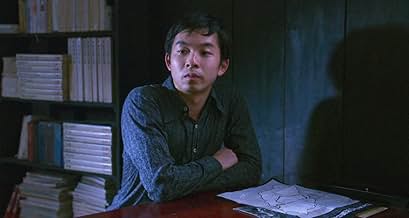IMDb RATING
7.2/10
3.2K
YOUR RATING
When Japan surrenders at the end of World War II, soldier Hiroo Onoda retreats into the jungles of the Philippines to continue the war himself for another 10,000 days.When Japan surrenders at the end of World War II, soldier Hiroo Onoda retreats into the jungles of the Philippines to continue the war himself for another 10,000 days.When Japan surrenders at the end of World War II, soldier Hiroo Onoda retreats into the jungles of the Philippines to continue the war himself for another 10,000 days.
- Director
- Writers
- Stars
- Awards
- 5 wins & 20 nominations total
Yûya Endô
- Hiroo Onoda - Young
- (as Endô Yûya)
Kanji Tsuda
- Hiroo Onoda - Old
- (as Tsuda Kanji)
Yûya Matsuura
- Kinshichi Kozuka - Young
- (as Matsuura Yûya)
Tetsuya Chiba
- Kinshichi Kozuka - Old
- (as Chiba Tetsuya)
Shinsuke Kato
- Shôichi Shimada
- (as Katô Shinsuke)
Kai Inowaki
- Yûichi Akatsu
- (as Inowaki Kai)
Issei Ogata
- Major Yoshimi Taniguchi
- (as Issey Ogata)
Taiga Nakano
- Norio Suzuki - The Tourist
- (as Nakano Taïga)
Nobuhiro Suwa
- Tanejirô Onoda - Onoda's Father
- (as Suwa Nobuhiro)
Mutsuo Yoshioka
- Captain Hayakawa
- (as Yoshioka Mutsuo)
Tomomitsu Adachi
- Governor-General Shigenori Kuroda
- (as Adachi Tomomitsu)
Kyûsaku Shimada
- Lieutenant Suehiro
- (as Shimada Kyûsaku)
Jemuel Satumba
- Filipino Prisoner
- (as Jemuel Cedrick Satumba)
Ryû Morioka
- Student
- (as Ryu Morioka)
Akira Morita
- Extra
- (as Morita Akira)
- Director
- Writers
- All cast & crew
- Production, box office & more at IMDbPro
Featured reviews
In the closing phase of the Second World War, Imperial Japan inserts numerous specially trained soldiers throughout the Pacific islands whose secret mission is to survive at all costs and wage an unending campaign of guerrilla warfare. This film depicts the three-decade campaign of postwar "resistance" waged on Lubang Island, Philippines by Hiroo Onoda, the very last of the infamous Japanese "holdouts" who refused to accept the war had ended, against all reason and repeated attempts to make contact.
As a film, it's great - it's dramatic and engaging, with great writing, direction, and acting. But the deeper social reality is quite disturbing. Onoda and others like him are revered by many in Japan as exemplars of grit, determination, and steadfast dedication to duty, rather than as exemplars of the kind of rigid fanaticism and pathological obedience that made a continent's worth of war crimes possible.
As a film, it's great - it's dramatic and engaging, with great writing, direction, and acting. But the deeper social reality is quite disturbing. Onoda and others like him are revered by many in Japan as exemplars of grit, determination, and steadfast dedication to duty, rather than as exemplars of the kind of rigid fanaticism and pathological obedience that made a continent's worth of war crimes possible.
Although a little bit long, this is about offering us to share a rather unique and captivating life experience, that of brainwashed Japanese soldiers who only stopped the war 30 years after the capitulation. I appreciated the warm and moist beauty of the jungle and the tropical forest, the change of scenery provided, the sober image which seems authentic and of the period, the "film" aspect and documentary grain. Documentary also as long as there is no lady state. Innocent people go there. The story that is told to us is quite simply captivating and I would not have believed that this anecdote from History, which could be summed up in a few lines, could fit into such a great film. With hindsight, however, I can understand that it does not please some who would fall into boredom; with this film it's a bit all or nothing, you have to succeed in immersing yourself. It is a French film, and as such it must be emphasized that it is a nugget.
Greetings again from the darkness. There has been no shortage of conspiracy theories, either recently or historically, that have left non-believers bewildered at how 'the other side' held firm. Writer-director Arthur Harari and his co-writers Bernard Cendron and Vincent Poymiro bring the remarkable struggle of Hiroo Onoda to the screen. Onoda was a Japanese soldier who refused to believe WWII ended, and instead, continued his mission of resistance by spending thirty years in a Filipino jungle.
Onoda was only 22 when he entered the war in 1944. He is played as a young man by Yuya Endo, and in later years by Kanji Tsuda. The film goes mostly in chronological order, with only occasional flashbacks to Onoda's "special training" by Taniguchi (Issey Ogata), his trainer and trainer. The passing of years is noted on screen, and we watch as Onoda's squadron shrinks in size, holding at four for quite a while, before shifting to two, and finally only he remains. During the special training, Taniguchi declares, "You don't have the right to die", instilling a firm commitment to the cause in Onoda.
Also seared into Onoda's brain is the proclamation of, "We'll come back for you. No matter how long it takes, we'll come back for you." Still, it's fascinating to see his determination to keep fighting, despite so many signs that the war was over. He viewed magazine articles and radio broadcasts as tricks to draw him away from his mission ... going so far to decipher a coded message that was anything but that.
The young man who finally succeeds in lulling Onoda out of the jungle has his own mission - actually three of them: finding a panda, locating Onoda (by this time a legend), and tracking down a Yeti. It's a bittersweet moment for the long-dedicated soldier, and he went on to live many more years as a home country icon - considered a nationalist man of honor by some, a murdering fool by others. The film, and Onoda's saga, makes us question the point of war when it's impossible to tell if the war is over or ongoing. Harari's film is almost three hours, which is entirely too long ... but significantly shorter than the time Onoda spent in the jungle.
Releasing in theaters on October 14, 2022.
Onoda was only 22 when he entered the war in 1944. He is played as a young man by Yuya Endo, and in later years by Kanji Tsuda. The film goes mostly in chronological order, with only occasional flashbacks to Onoda's "special training" by Taniguchi (Issey Ogata), his trainer and trainer. The passing of years is noted on screen, and we watch as Onoda's squadron shrinks in size, holding at four for quite a while, before shifting to two, and finally only he remains. During the special training, Taniguchi declares, "You don't have the right to die", instilling a firm commitment to the cause in Onoda.
Also seared into Onoda's brain is the proclamation of, "We'll come back for you. No matter how long it takes, we'll come back for you." Still, it's fascinating to see his determination to keep fighting, despite so many signs that the war was over. He viewed magazine articles and radio broadcasts as tricks to draw him away from his mission ... going so far to decipher a coded message that was anything but that.
The young man who finally succeeds in lulling Onoda out of the jungle has his own mission - actually three of them: finding a panda, locating Onoda (by this time a legend), and tracking down a Yeti. It's a bittersweet moment for the long-dedicated soldier, and he went on to live many more years as a home country icon - considered a nationalist man of honor by some, a murdering fool by others. The film, and Onoda's saga, makes us question the point of war when it's impossible to tell if the war is over or ongoing. Harari's film is almost three hours, which is entirely too long ... but significantly shorter than the time Onoda spent in the jungle.
Releasing in theaters on October 14, 2022.
This is really an outstanding movie which is not a "war movie" but rather a complex psychological one of what drive us as a person to take a stand when confronted to situations we could not have ever imagined. Of course education, training, the society, family history, the culture of the country in which you were born, all of this will play a major role with regard to the choice(s) that we will take in life. However, as per prior personal experiences and call it maybe "the genetics" these choices will be different for people even having the same cultural background. The life story of lieutenant Onoda is maybe what you could call an "extreme" one which, besides cultural background, was certainly facilitated by his "physical adaptation" allowing him to endure the certain hardships and harrowing experiences he encountered during his many years of isolation.
Onoda is a long movie but its length was necessary not to develop the psychological development of the main character but rather to allow the viewer to "feel" what it must have meant in terms of hardship, endurance and faith the choices that Lieutenant Onoda took to honor his pledge of obedience regardless the validity of the cause he chose to defend.
The fact the movie Onoda was released in full pandemic, of the relatively unknown nature of the real history of lieutenant Onoda and that the film must only be shown in the Japanese language (with subtitles) as an indispensable component of the story will certainly limit its diffusion in theaters. Still this will not hamper the fact that this is cinema of the highest caliber and that Arthur Harari, its French director succeeded in making an admirable movie not to be missed!
Onoda is a long movie but its length was necessary not to develop the psychological development of the main character but rather to allow the viewer to "feel" what it must have meant in terms of hardship, endurance and faith the choices that Lieutenant Onoda took to honor his pledge of obedience regardless the validity of the cause he chose to defend.
The fact the movie Onoda was released in full pandemic, of the relatively unknown nature of the real history of lieutenant Onoda and that the film must only be shown in the Japanese language (with subtitles) as an indispensable component of the story will certainly limit its diffusion in theaters. Still this will not hamper the fact that this is cinema of the highest caliber and that Arthur Harari, its French director succeeded in making an admirable movie not to be missed!
What a good surprise this film directed by a French and speaking of the war in the Pacific from the Japanese point of view. So unexpected and awesome in the same time. I could not believe that this young director is not under the influence of Clint Eastwood's LETTERS FROM IWO JIMA, John Boorman's HELL IN THE PACIFIC or Kon Ichikawa's FIRES IN THE PLAINS. Impossible for me to think that he would have never heard of those three iconic films. Back to this one, I don't know how anyone could say harm about it, except maybe a bit too long; yes, maybe. Plus, it speaks not only of the japanese soldiers, but not the kamikaze or simple fighters, but some kind of secret section of soldiers sent into a Philippines Island. The young director from France is also aware of the Mizoguchi's influence and with the poetic lines of the Japanese spirit. Good film to be watched at any cost. Only for this incredible but so authentic story.
Did you know
- TriviaWhilst set on a remote Philippines Island the film was in fact shot on location in the kingdom country of Cambodia.
- How long is Onoda: 10,000 Nights in the Jungle?Powered by Alexa
Details
- Release date
- Countries of origin
- Official sites
- Languages
- Also known as
- Onoda: 10,000 Nights in the Jungle
- Filming locations
- Bokor National Forest, Cambodia(jungle)
- Production companies
- See more company credits at IMDbPro
Box office
- Budget
- €4,530,000 (estimated)
- Gross worldwide
- $262,276
- Runtime2 hours 53 minutes
- Color
- Aspect ratio
- 1.85 : 1
Contribute to this page
Suggest an edit or add missing content

Top Gap
What is the Canadian French language plot outline for Onoda, 10 000 nuits dans la jungle (2021)?
Answer
































